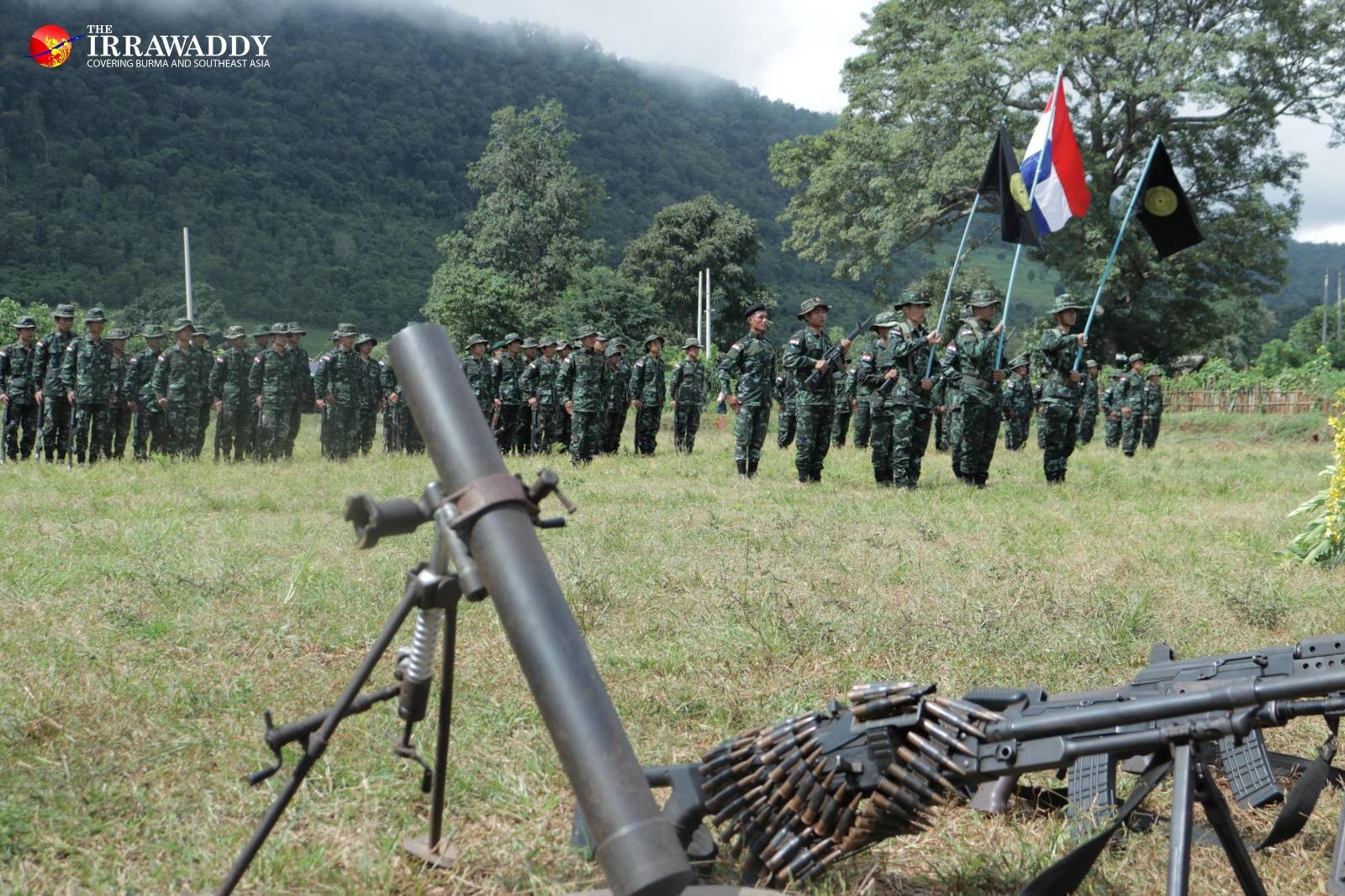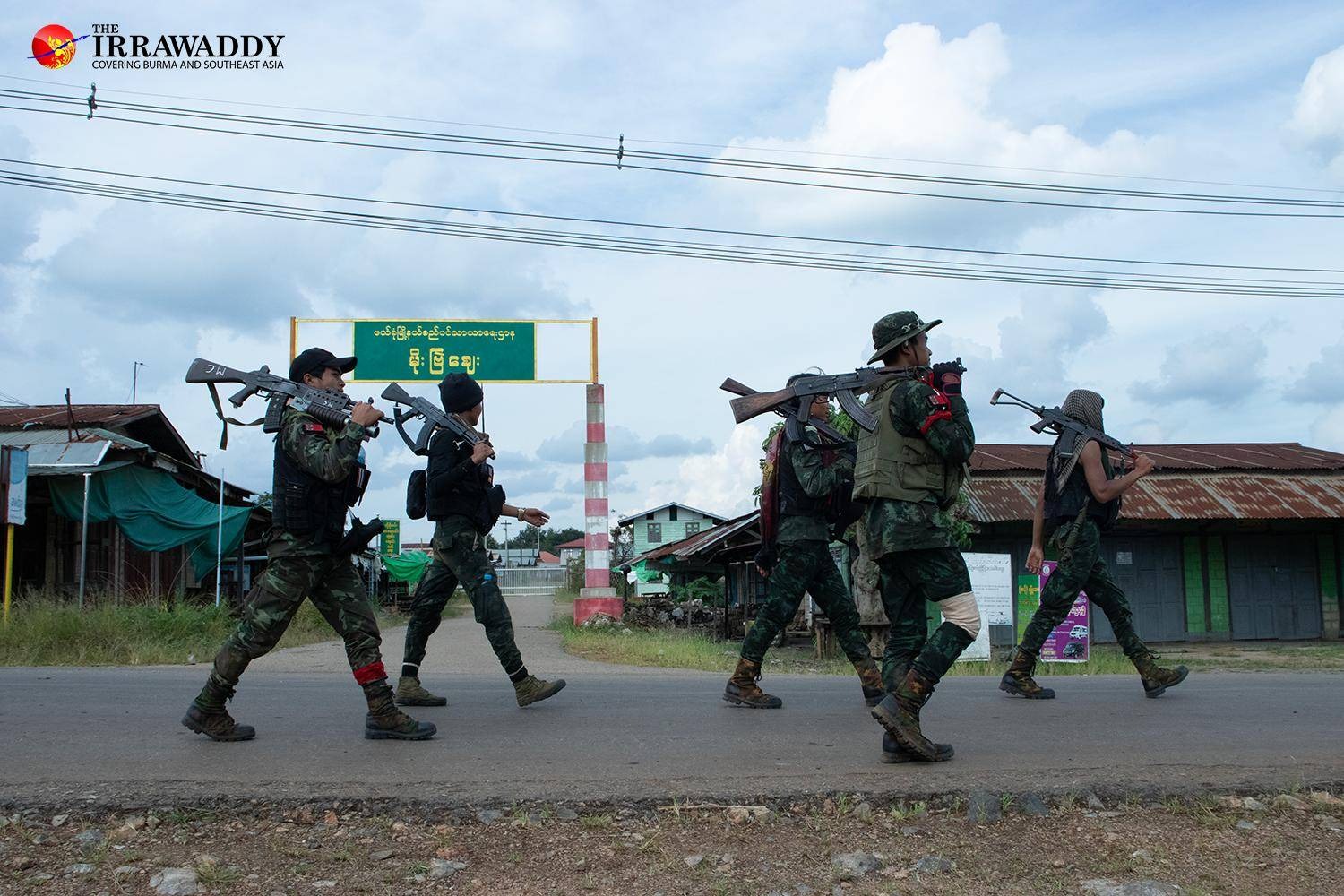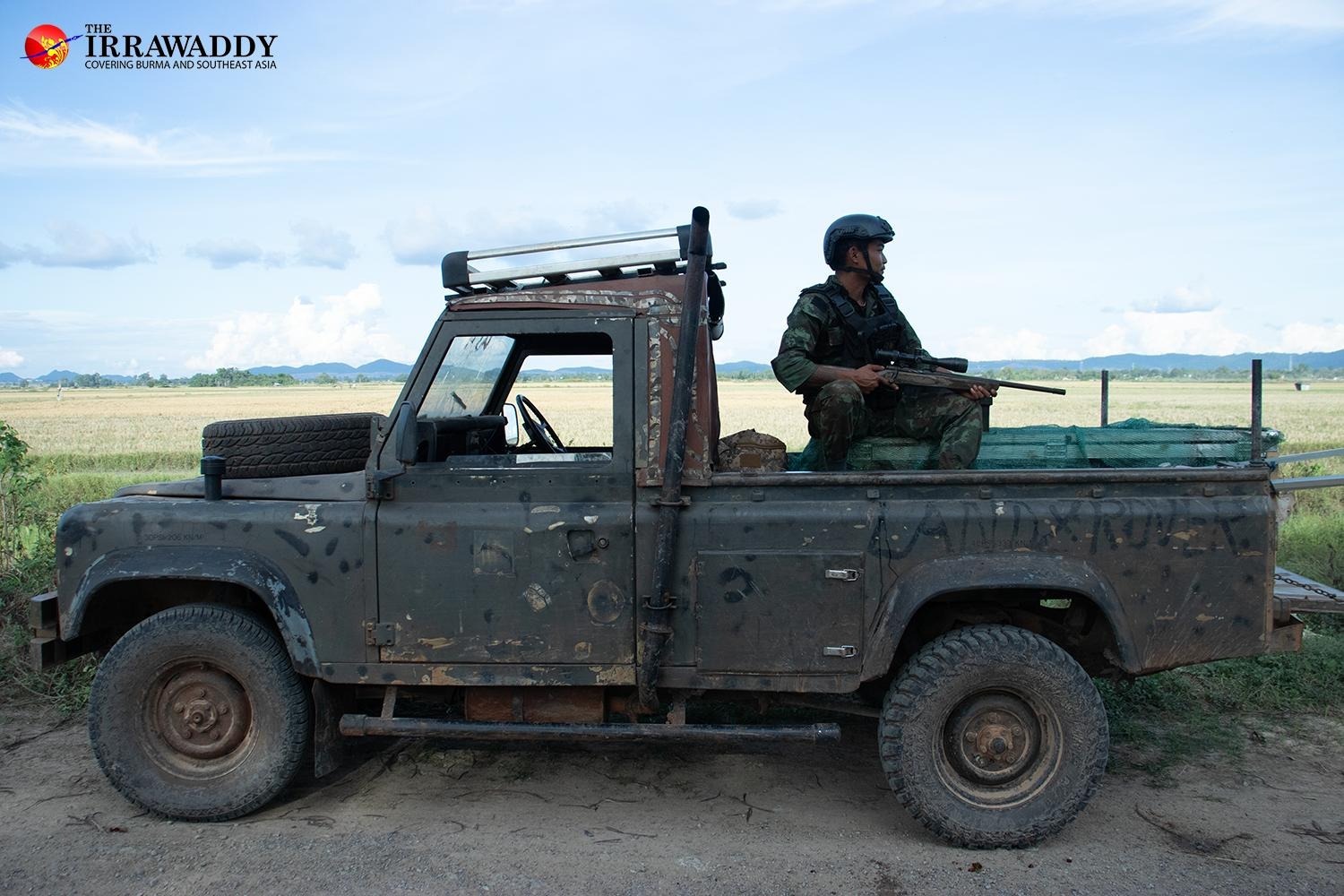Allied resistance forces in Kayah (Karenni) State have made impressive gains since launching their anti-regime Operation 1111 offensive on November 11.
In a wide-ranging interview with The Irrawaddy, Karenni Nationalities Defense Force Deputy Commander-in-Chief Marwi describes the current battle situation, the objectives of the offensive, and the dangers that still lie ahead.
The Irrawaddy: How is Operation 1111 progressing since its launch in Kayah (Karenni) State on November 11?
KNDF Deputy Commander Marwi: Our primary target is to seize control of Loikaw, which is the command center of the regime [in Kayah State], and to pull down the pillars of the junta’s administrative machinery.
We started attacking junta positions around Loikaw at 5 am on November 11. We have now occupied all junta positions surrounding Loikaw town. We are attacking junta strongholds in the town, including Loikaw University and the state police station. The junta’s administrative mechanism has collapsed in the town as our forces enter and attack junta troops there.
Which revolutionary groups are involved in Operation 1111?
Those involved in the fighting are the Karenni Nationalities Defence Force, Karenni Army, Karenni National People’s Liberation Front, People’s Defense Forces [PDFs] from Demoso, Moe Bye, Pekon, Loikaw townships, and some units under the command of the National Unity Government, as well as some local resistance groups. It is fair to say that almost all of the armed groups in Karenni State are involved.
A video clip shows you asking junta soldiers at Loikaw University to surrender even though your superior troop numbers could have annihilated them. Can you explain the fighting there?
We needed to pass through Loikaw University to get into Loikaw town. Two military battalions were deployed there to defend our attack. We started attacking them on Nov. 13. At around 3 pm on the fourth day of the attack, they were cornered. They requested reinforcements and air and artillery support. We could have wiped them out. They were outnumbered and outgunned. But according to the rules of engagement, if the enemy wants to surrender, we have to accept it. So, we warned them before we launched the final assault. I gave them 30 minutes to surrender or face a lethal attack. I gave them a second warning after 20 minutes. Around three minutes later, they shouted that they would surrender. I told them to leave their weapons behind and come out one by one. These are the rules of engagement; they are what good soldiers should do. We have not taken up arms out of cruelty.
There were over 30 of them. We are taking care of them according to our rules on prisoners of war and international military law. After they walked out of the university campus, we gave them medical care, including those who were seriously wounded. They [the regime] have blocked delivery of medicines and medical supplies to Karenni State. They seize or destroy any they find. We took great pains to bring in medicines to take care of the civilian population and our comrades. And we have used those medicines to treat those who once destroyed them. We have shown magnanimity. They [junta troops] are humans and they have a right to life.
What has Operation 1111 achieved so far? How many casualties has each side suffered?

The operation has been successful so far. First, junta troops have been forced to withdraw from their positions in Karenni State. Second, they have been confined to their bases. Third, they can’t help each other when they are attacked even though they are only around 300 meters from each other. Their administrative mechanism has collapsed in Loikaw town. We have occupied nearly half of the town and we can move around freely there. The regime has suffered between 200 and 300 casualties in the 10-plus days since the offensive was launched. We found over 60 bodies of junta soldiers in the compound of the Loikaw University rector. There were also piles of bodies in other places. In some places, the odor was so bad that we could not approach. We have also suffered casualties. We recovered all the bodies of our comrades and organized proper military funerals. But we have kept on fighting to take control of the entire town.
How much territory has been taken by revolutionary groups in Kayah State?
In previous interviews, I said we had control over some 60 percent of territory, the regime controlled some 20 percent, and both sides were active in the remaining 20 percent. But today, it is fair to say that we have seized control of around 80 percent. The regime has some 10 percent, and both sides are active in the remaining 10 percent. The Karenni State Interim Executive Council is currently installing its own administration.
A junta warplane was shot down by revolutionary groups in Kayah State on the first day of Operation 1111 and one of the pilots has been arrested. What information have you gained from his interrogation?
We downed the K-8 fighter jet with two machine guns on the first day of the fighting. One of its wings was hit and the aircraft turned southwards. In the evening, we heard that a pilot had bailed out, the plane had crashed, and his military equipment had been found. The KNDF captured the pilot, who holds the rank of major, a week later. We are interrogating him carefully. It is still too early to reveal his testimony. He is one of those responsible for war crimes. We will publicize his detailed confession soon.
What expectations does the KNDF have about Operation 1111?
It is not enough to merely fight back against junta troops that come to attack us. For the revolution to succeed, we need to fight in the locations where junta troops are present. We need to destroy the regime’s command centers. We need to carry out a large-scale counter-offensive against the regime. The objective of Operation 1111 is to topple the regime’s administrative mechanism. We will make junta troops feel too unsafe to leave their bases in Loikaw. The ultimate goal of the operation is to drive them out of Karenni State. The operation should enable us to bring the entire Karenni State under our control, install our own administration, and deliver public services to the people.
Kayah State lies close to Naypyitaw, so Operation 1111 poses a direct military threat to the regime’s nerve center. Observers believe the regime may respond with indiscriminate attacks to regain control of Loikaw. What preparations have resistance groups made to protect the civilian population?
We outnumber junta troops in Loikaw. For the time being, our target is Loikaw. We will consider other things only after seizing Loikaw.
We are conducting this operation in consultation with political entities. Just as we fight the battle, political entities are doing their job to install a civil administration, and rescue and help civilians who have been displaced by the fighting. Displaced people can seek help from the home affairs department of the Karenni State Interim Executive Council [IEC]. The council is doing its best to meet their needs. We have also installed a law enforcement department to facilitate the administration. And we have negotiated with our allies [in other regions and states] to help civilians who have fled into their territory. We will step up our attacks and fight until [regime troops] surrender or return to the embrace of the people. Family members of junta military personnel are also suffering heavily from the impacts of the fighting. Will they let their husbands or sons die protecting the interests of Min Aung Hlaing and a handful of individuals? Or will they join the people with dignity? It is time for them to think about it. The executive council is drafting plans to take proper care of defectors and their families.
What do you plan to do with the rector and non-striking staff of Loikaw University, as well as junta soldiers captured in the battle?

We have a duty to rescue unarmed people during the fighting, whether they are striking government employees, still working [for the regime], or civilians. We have a responsibility to save them if they are trapped by the fighting. We rescued the staff of Loikaw University despite a barrage of bullets, shells and bombs. We handed them over to the IEC’s home affairs department. We did not abduct any [civilians] during the fighting. We are holding no one except prisoners of war. There were rumors that the rector was killed by us. This untrue. We want to tell the families of university staff not to worry. It was the Myanmar military’s responsibility to rescue them but it left them behind in the fighting.
What do you want to tell Loikaw residents and civilians in the rest of Kayah State about the operation?
For now, the regime is bombing indiscriminately as it has lost control of large swaths of territory. It is using multiple rocket launchers that can fire up to 40 shells at a time. So there are air and artillery strikes everywhere. We would like to urge the people to leave [Kayah State] if possible. If not, they should take shelter in strong buildings and trenches. I would like to urge them to endure the suffering for now so they can enjoy peace for the rest of their lives. By the time we entered Loikaw, the town had already suffered damage caused by air and artillery strikes. But we guarantee that public property will not be damaged by us. I would like to ask people to allow us to use their food and water. We will make sure their belongings such as cars, motorbikes and household items are not damaged or stolen. We have heard that junta troops have been ordered to shoot anyone on sight in Loikaw town. Junta soldiers gunned down five civilians who returned to retrieve possessions from their homes. They also shot dead a person who went to recover the bodies. They are shooting anyone indiscriminately, whether they are civilians or not. So, we urge civilians not to rush to collect their belongings.
The resistance offensive is also ongoing in other areas including northern Shan, Rakhine and Chin states as well as Magwe and Sagaing regions. There have been calls for a nationwide operation. What is your view on that?

Operation 1111 is inspired by Operation 1027 [launched in northern Shan State on Oct. 27]. It is important that we launch operations in our respective areas so that a nationwide coordinated attack takes shape on its own. We urge revolutionary groups in other areas to carry out similar operations. We need to help each other, take strength from each other’s success and try to destroy the military dictatorship. We welcome and support the launch of any [anti-regime] operation that takes place. A KNDF battalion has joined Operation 1027. Some of our comrades have died in the fighting there. Our battalions also joined the battle for Kunlong [in northern Shan State]. The KNDF is ready to join all anti-regime operations across the country.
Do you have anything else you would like to say?
I would like to repeat my message to [regime] soldiers and police. We heartily and warmly welcome them to join the embrace of people. This is the most honorable act for society in the current situation. I would like to urge them to make the decision quickly for the sake of their families and relatives so that they can live with dignity in society. We will hand them jobs and opportunities according to their capabilities, once the military dictatorship is toppled. So, I urge them to make the right decision promptly before facing destruction, and defect to us before it is too late.
















